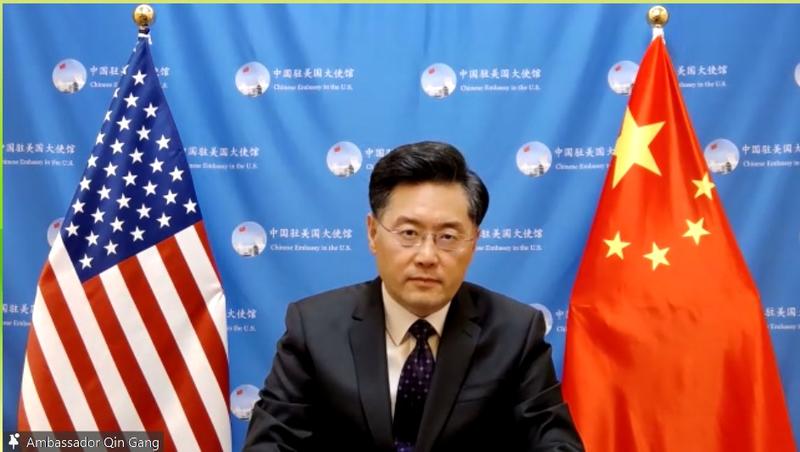Support of Taiwan independence could spark military conflict, top envoy warns
 Chinese Ambassador to the US Qin Gang. (PHOTO PROVIDED TO CHINA DAILY)
Chinese Ambassador to the US Qin Gang. (PHOTO PROVIDED TO CHINA DAILY)
China's top envoy to the United States has urged the administration of US President Joe Biden to respect the one-China principle in deeds rather than words during his first interview with US media since taking office in July.
"We have taken notice of President Biden's words that the US does not support Taiwan independence, the US wants to see peace and stability across the Taiwan Straits, and the US will adhere to its one-China policy, but so far we haven't seen many actions to honor his words," said Ambassador Qin Gang in an interview with National Public Radio's Morning Edition on Thursday.
Speaking of the recent escalation in tensions across the Taiwan Straits, Qin said: "This is because the Taiwanese authority is trying to seek independence agenda by borrowing support and encouragement of the US, and the US is playing a Taiwan card."
The one-China principle is the most important foundation of Sino-US relations in the past decades, but it is "being hollowed out by the US", he added.
The ambassador said the US has been walking away from its commitments bit by bit by increasing official links with Taiwan and upgrading them, selling more advanced weaponry to the Chinese island and sending military personnel there.
He noted the Taiwan question is the "biggest tinderbox" between China and the US, emphasizing "we will do our utmost in the greatest sincerity to achieve a peaceful reunification, which we believe is in the best interests of people across the Taiwan Straits, in the best interests of China-US relations, in the best interests of peace and stability in the region".
"If the Taiwanese authority, emboldened by the US, keeps going down the road for independence, it most likely (will) involve China and the US, the two big countries, in a military conflict. China does not want to have conflict or confrontation with the US. The US does not want war with China. So, no war, no conflict, is the biggest consensus between us. So let's work together to contain the separatist forces of Taiwan, to give peace a chance," he said.
Deeming the Sino-US relationship "the most important one", Qin said "we must work well and not mess it up".
"But the question is: Can the US respect and accept China's rise as a positive force to maintain or to facilitate world peace and prosperity? Can the US believe that China's rise will benefit other countries, benefit people in the US and provide more business opportunities and more jobs?"
On Friday, Lai Ching-te, a senior figure from Taiwan, had an online meeting with US House Speaker Nancy Pelosi during his "transit" through San Francisco.
Chinese Foreign Ministry spokesman Zhao Lijian said on Sunday that China rejects all forms of official interactions between the US and Taiwan and has lodged a solemn representation with the US side over Lai's virtual meetings with US lawmakers and others.
"We urge the US to abide by the one-China principle and the stipulations in the three China-US joint communiques, stop the erroneous acts of having official exchanges with Taiwan, avoid sending any wrong signal to the Taiwan independence separatist forces, and refrain from further undermining Sino-US relations and peace and stability across the Taiwan Straits," Zhao said.
Qin also said Beijing and Washington should work together rather than trying to outpace each other or to suppress the other's development.
"In China's belief, we hope that good relationship will be established based on the principles of mutual respect, peaceful coexistence and win-win cooperation," he said.
Splendid Games promised
Speaking of the Beijing Winter Olympics, which will begin on Friday, Qin said Beijing is ready to host the Games as all venues, stadiums, facilities are in perfect condition, and organizing and operation work is well on the way.
"We are confident to deliver a streamlined, safe and splendid Games as we promised to the world," he said.
When asked about a narrative that some Westerners believe that China does not respect the personal freedoms of its people, Qin rejected it as a "one-sided observation".
"If you ask if people have freedom and human rights, you need to ask the people of the country itself," he stressed, saying that more than 90 percent of Chinese people show support toward the government, citing two recent surveys by Harvard University and consultancy firm Edelman.
Qin also slammed lies about the Xinjiang Uygur autonomous region during the interview.
The Uygur people enjoy the rights and freedom guaranteed by China's Constitution, and their population has risen from 5.5 million to 11 million over the past four decades.
"The so-called genocide or forced labor are lies of the century. There's no genocide at all," Qin said.
Contact the writers at zhaoruinan@chinadaily.com.cn


